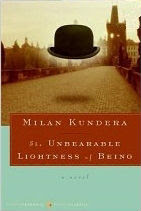Armchair Traveller Challenge #2
 Tomas is a doctor and a perpetual skirt-chaser, always seeking that indefinable something that sets one woman apart from all others, even if all members of the sex differ by just one part in a million. Even after Tereza, a waitress with dreams bigger than her small town, wanders into his life, he cannot bring himself to completely settle down. Yet he cares about Tereza; enough to abandon the safety of Zurich and follow her back to Prague after the Russian invasion of Czechoslovakia.
Tomas is a doctor and a perpetual skirt-chaser, always seeking that indefinable something that sets one woman apart from all others, even if all members of the sex differ by just one part in a million. Even after Tereza, a waitress with dreams bigger than her small town, wanders into his life, he cannot bring himself to completely settle down. Yet he cares about Tereza; enough to abandon the safety of Zurich and follow her back to Prague after the Russian invasion of Czechoslovakia.
His former mistress is Sabina, a modernist painter who gladly takes the opportunity to flee the soul-crushing sameness enforced by the communists. She settles in Geneva with her new lover Franz, an academic with whom she shares too many misunderstandings to be truly happy; and she knows that one day she will desert him like she has deserted everyone and everything else. He, blissfully unaware of this, dreams of having a political cause like he pictures her as having, something that will drag him out of academia and into the revolution.
His career stifled by the communist regime, Tomas confronts the insubstantiality of life in a world where history is meaningless for it reveals nothing of the rightness or otherwise of any given decision. Unlike a science experiment, which can be run many times with changing variables, events occur but once; no-one can ever see how things might have turned out if a different path had been taken. Sabina faces her own form of weightlessness: that of a life without anything to tie her down, and the impossibility of having such bonds, for she would break them like she has all others. Each discovers the unbearable lightness of being.
Another good choice for the Armchair Traveller Reading Challenge! There were a few side-trips into Switzerland, France, America and Cambodia, but mostly the book stayed in Czechoslovakia (mainly Prague) before and during the Russian occupation. (I don’t think I even realised Czechoslovakia had been occupied, so this was a valuable lesson as to history as well as to place.) Eye-opening, too, with its depiction of life under a communist regime - the decamping and demoting of intellectuals, the constant suspicion and second-guessing of everyone’s motives, and the difficulty faced by anyone who, like Sabina, wishes to pursue an independent path.
In terms of construction this is one of the oddest books I’ve read. Not only does the author step in to directly address the reader, he also freely admits that his characters are fictional and analyses them for you. This pattern is established early enough that I could accept it, but it makes it near impossible to think about the characters after closing the book. There’s nothing to think about; they’ve already been dissected and laid out in black and white - and they’re made up, anyway. Perhaps it’s just as well they were described in such detail; there’s not a great deal of plot supporting the characters and the philosophy. I think I would have preferred it if there was; a sizeable portion of the philosophy went straight over my head, particularly the political stuff (i.e. all of Part 7). But then politics isn’t something I’m familiar with; I only pay attention to it when a politician does something particularly outrageous - or enraging.
The ideas-heavy nature of the book made it of necessity a leisurely read; I found myself falling into a rhythm of read, pause, muse, repeat as I attempted to digest it all. And I noticed something curious. One of the book’s main philosophical tenets is that events don’t repeat, hence there is no way to trial different decisions ergo no way to know which is best. Yet the book itself repeated! This was particularly noticeable in the sections dealing with Tomas and Tereza; much of the same timespan and many of the same events would be gone over from each of their viewpoints. And one of Tomas’s metaphors was deployed eight times in the 104 pages written from his perspective - once every thirteen pages. Even the narrative as a whole circled around in time; one incident was referred to at least twice, yet at the point where the book ended it was still to occur. This was less disorienting than it might sound as, with the exception of the invasion of 1968, Kundera never put a date to anything, and often skipped over several years in a single sentence. Realising that there was no hope of keeping the chronology straight, I gave up trying.
I can easily see myself returning to this book on multiple occasions in years to come. Not only to try to stretch my mind to understand it all, but to revisit favourite passages or ideas and begin musing all over again.
Rating: B+











I am reading Rebecca as well. This is my third attempt to try to read this book, and I think this time I will succeed.
ReplyDelete(Here today via Semicolon) Thanks for a great review, this is going on to my List of Books That Need to be Read Soon.
ReplyDeleteThe philosophy is a great play off of the existential movement and the idea circulating through the work is that of eternal return, an intellectual idea from the classical period that was used by Nietzsche. When I read The Unbearable Lightness of Being I was struck by how this concept plays such a major role.
ReplyDelete